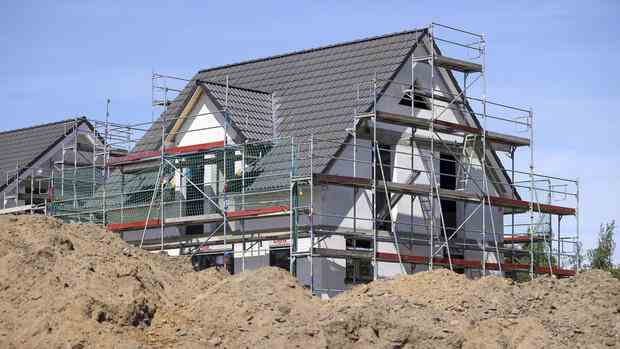Berlin The number of building permits for apartments in Germany continued to decrease over the course of 2022. According to the Federal Statistical Office (Destatis), the construction of 354,400 apartments was approved last year. That was 6.9 percent or 26,300 fewer apartments than in 2021. At that time, 380,700 building permits were the highest since 1999.
The number of building permits was last lower than in 2022 in 2018 with 346,800 apartments, according to preliminary figures from the Federal Statistical Office.
The figures include both building permits for dwellings in new buildings and new dwellings in existing buildings. According to the statistical data, the decline in the number of building permits for single-family houses was particularly strong. The building authorities approved 78,100 new single-family homes. That is 15,800 fewer than in 2021. The number of approved new apartments in two-family houses also fell at an above-average rate in 2022: 27,700 apartments were approved in two-family houses, 4,400 fewer than in the previous year.
Around 63 percent of new apartments in Germany are in apartment buildings. Due to the still high number of approvals in the first half of 2022, only 1.6 percent or 3100 fewer apartments were approved for apartment buildings in 2022 as a whole than in 2021. However, the downward trend accelerated over the course of the year.
According to Destatis, the main factors contributing to the decline in construction projects in 2022 are a lack of materials and high costs for building materials, a shortage of skilled workers in construction and increasingly poor financing conditions.
Economy calls for countermeasures
The economy expressed concern. The General Manager of the Main Association of the German Construction Industry, Tim-Oliver Müller, said: “The difficult mix of rising interest rates, sharp increases in material and construction prices, stopped new construction subsidies and falling disposable income choked off new residential construction, especially from mid-2022. Reaching the political target for new construction of 400,000 apartments, but above all creating sufficient affordable living space, will no longer be possible for a long time to come.”
Jürgen Michael Schick, President of the German Real Estate Association (IVD), explained that the negative trend in building permits will continue in 2023 if the traffic light coalition does not take effective countermeasures.
Schick includes, firstly, new construction subsidies amounting to ten billion euros per year. The funding for the climate-friendly new building proposed by Federal Building Minister Klara Geywitz (SPD) is insufficient at 1.1 billion euros per year and does not allow for economically viable construction.
Secondly, he called for the promotion of property for the middle of society. In the current interest rate environment, combined with the general rate of inflation, this group can no longer afford to own their own home. This was shown by the strong decline in building permits for single and two-family houses.
As a third point, Schick reiterated the demand from industry for a simplification and flexibilization of planning and construction law as well as faster approval procedures. The thicket of regulations and standards that has grown over the years makes construction more expensive and slows down both new construction and the modernization of real estate holdings.
One of the reasons for the declining number of permits is the immensely increasing construction costs. “The high financing and building material costs are further slowing down the willingness to invest,” warned Felix Pakleppa, general manager of the German Construction Industry Association (ZDB), back in February.
>> Read here: Up to 150,000 euros per apartment – KfW launches new new construction subsidy program
Burkhard Siebert, General Manager of the Hesse-Thuringia Construction Industry Association, gives concrete figures for his state: “In Hesse, construction costs rose by 13.8 percent in 2022, which is the strongest increase in construction prices in 52 years. Politicians must finally digitize and accelerate planning and approval processes. Homemade price drivers such as the lack of landfill must be remedied. Building must not become more expensive.”
danger to the industry
According to the ZDB, the companies are reducing the order backlog. However, should the critical situation in residential construction worsen and should orders continue to plummet, it will not only become increasingly difficult for tenants in large cities, says Pakleppa.
There is also a considerable risk for the industry of not being able to maintain the number of employees. That would be devastating in view of the immense construction work involved, particularly in the area of inexpensive residential construction.
In principle, the number of building permits is considered an important early indicator for future construction activity, since building permits represent planned construction projects. Pakleppa explained, however, “that granted building permits meanwhile hardly lead to construction contracts. We are currently expecting 280,000 apartments to be completed in 2022 and 245,000 apartments in 2023”.
>> Read here: Real estate experts expect up to 700,000 missing apartments
According to the Federal Statistical Office, 293,393 apartments were completed in 2021. The federal government had set itself the goal of building 400,000 new homes every year.
More: That is why housing construction in Germany is becoming increasingly difficult.

